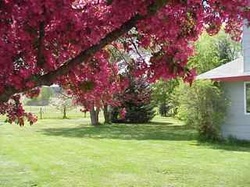When confronting these nuisances, it's important to remember that weeds are plants and they have the same life cycle of all other plants. There are annual weeds and perennial weeds. Knowing which kind you have can help you battle them appropriately too.
The first action you can take in the spring is the application of pre-emergent herbicides. They work well at controlling some of the seasonal weeds. You'll often see them packaged as "weed and feed" products where a pre-emergent herbicide is combined with a fertilizer. The herbicide hinders growth of weeds while the fertilizer encourages growth of grass.
Pre-emergent herbicides are chemicals that keep weeds from growing. Note that they don't kill established weeds or the seeds, they just keep new weeds from growing, usually by affecting germination of the seed. Most importantly, they need to be applied before the weed is growing. If you wait until you see weeds, it's too late to apply a pre-emergent herbicide. Also, if you apply them too early they can dilute or dissipate and have no effect when weeds begin to grow.
When average soil temperature reaches about 50 degrees, some time between March 15 and April 1 in most areas, weeds like crabgrass and clover beginning emerging. Pre-emergent herbicides are specifically designed for those summer weeds. So now is a good time to apply them; waiting much longer will lessen their effect. In cooler areas like mine, it's okay to wait as late as April 15. In very cold regions you can wait until May 1 and in warm areas you might want to apply as early as March 1.
Yes, I know you missed the opportunity if you live in a warm region, but you can save yourself time and effort by realizing it's too late. Applying a pre-emergent herbicide now will do no good.
To determine the best time to apply a pre-emergent herbicide in your yard, think about next year. Note when the weeds start growing this year, subtract two or three weeks, and choose that date as the time to apply the herbicide next year.
Also, be aware that a pre-emergent herbicide is not picky about the seed growth it hinders. That's valid for grass seeds too. If you plan to re-seed your lawn, think twice about pre-emergent herbicides. Any grass seed you sow will be prevented from growing.
Once weeds are growing, it's time to turn to post-emergent herbicides. These are the ones that are specifically designed to kill the weed after it is already growing. There are two types: selective, which will only kill targeted weeds; and non-selective, which will kill any plant. Herbicide labels will tell you which weeds they are for and when and how they should be applied. Rules for herbicide labels are very strict and they include a wealth of information, so read the label carefully because all herbicides are not created equal.
Selective herbicides like 2, 4-D (Weed B Gon) will kill broadleaf weeds like clover while leaving the slender grass blades alone. Non-selective herbicides like glyphosate (Roundup) will kill the weed, the grass, and any flowers that the mist blows on. Make sure you use the correct one for the weeds you're targeting.
There are natural pre-emergent herbicides too. Corn gluten is the most prevalent and one that you can find at many nurseries. It will be more expensive than chemicals, but achieves the same result using an all-natural component.
For post-emergent action, full-strength vinegar can kill weeds, but it often takes multiple applications. Molasses has also been proven to work on some weeds. Boiling water can kill some weeds, but it isn't very efficient. All of these methods run the risk of killing the grass nearby too.
I don't recommend two methods that you may hear about. Under no circumstance should you use gasoline or kerosene to kill weeds. It harms the environment, is dangerous, and isn't necessary with the other options available. Also, avoid using a blowtorch. A torch will kill weeds but also kills soil microorganisms and any other nearby plants and you also run the risk of starting a fire. In dry areas it should never be considered.
If you don't like applying chemicals of any type, your best option is to take matters into your own hands. Literally. Wait until weeds are growing, but before they set seed, and get out there with a screwdriver or weed puller and dig out every weed you see. There will be uncountable seeds already in place or blowing in from your neighbor's yard, but by physically removing the weed plant you keep it from propagating. Physical removal is best for perennial weeds like dandelions.
The best control for lawn weeds is to maintain a lush lawn. When the grass is well established, it makes it difficult for weeds to gain a foothold. If you are ready to attack weeds before they find a sanctuary, you'll lessen the amount of weed control you need in the future. Focus on growing good turf and your weeds problems will be a distant memory.

 RSS Feed
RSS Feed